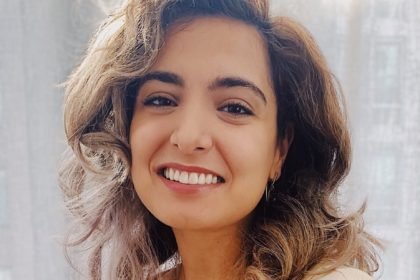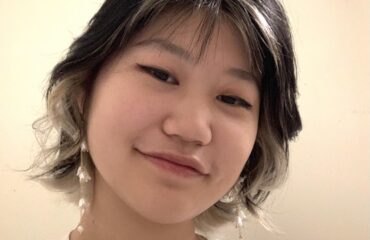Ghinwa Jawhari on her debut chapbook: BINT Interviewed by Sara Elkamel

Ghinwa Jawhari named her debut chapbook, selected by poet Aria Aber for publication by Radix Media, BINT, Arabic for girl. In Arab cultures, the word is also used to describe a virgin woman, of any age. In this series of poems, compact in form yet unbridled in lyricism, Jawhari explores the passage (particularly of those in Arab diaspora) from bint to woman: its wounds, its pleasures, and its inevitable reverberations on societal and self perception.
Jahwari is a Lebanese American writer (and practicing dentist), currently living in Brooklyn. Born to Druze parents in Cleveland, she grew up listening to poetry from her father, who often recited traditional poetry in Arabic, or Zajal, around the house. In middle school, she wrote little poems and saved them in spiral notebooks, before going on to study English, alongside chemistry, in undergrad. Over the past few years, her essays, fiction, and poetry have been featured in Catapult, Narrative, Mizna, The Adroit Journal, and other publications.
As an Arab woman myself, I found an incredible kinship with the speaker(s) in Jawhari’s poems. The opening poem, titled “condition”, piercingly captures the strain stepping into womanhood places on our relationship with our fathers; “when you had the sterile body of a child / you were loved by your father / now you’re grown”, she writes. For me, the erosion of the father’s unconditional love in tandem with the girl stepping into the body of a woman could not have been captured more poignantly, more resonantly.
And it’s not just the speaker’s voice that was familiar. Many of the poems in BINT have Arabic titles, and are decorated with objects that I myself grew up around—prayer beads and “blue eyes hung over the door”; the Mediterranean, which Egypt has in common with Lebanon—carrying the bodies of the girls in Jawhari’s poems. When we met (online) to talk about her stunning chapbook, Jawhari told me that it was her intention to write BINT for readers who would relate to it. “When you say to yourself: I’m going to write this to my sister or my cousin, suddenly it frees you to do whatever the hell you want to do,” she said.
In the interview below, Jawhari reflects on her insistence to avoid writing towards the white gaze, and shares the thought processes that led to her choice of form, language and imagery for BINT.
Sara Elkamel: I found an incredible tension between divulgence and restraint in BINT, in terms of both language and form. But I’d like to start by asking you specifically about form. Even though you’re tackling these expansive subjects that could probably fill notebooks—including queerness, intimacy, and what being a girl, or a woman, means to you—the poems materialize in these really slight, compressed shapes on the page. How did you arrive at these forms for BINT?
Ghinwa Jawhari: First, the chapbook was written for people who already know what a bint is. It’s not written for the white gaze. I didn’t want to spend time explaining the context. I was trying to figure out how to get across, in the smallest amount of words, facts central to our lived reality as girls—like in “counterfeit,” the poem about getting sewed up to ‘restore’ her virginity; becoming “regirled.”
And secondly, the form was informed and constrained by this project being a chapbook. I was at home during the COVID outbreak, and it was the first time I wasn’t working in a long time. I was excited to be sitting at my desk every day and focusing on a single theme. Because I knew it was going to be a chapbook, everything had to lend to brevity. It’s less than 30 pages—so in order for the pieces to work together, they all had to be concise. They’re in conversation with one another.
Sara Elkamel: I’m intrigued by this choice of not writing towards a western gaze—especially since Arabic words often appear in your poems, most notably in the title, BINT, which means girl, yes, but also signifies “virgin” in our culture. As poets, I think that sometimes when we use Arabic, we feel the need to explain or translate what we’re saying as we say it, which can very well get in the way of the poem. And I’ve definitely done that in my work before.
Ghinwa Jawhari: Yeah, I’ve done that too! So much of my work before BINT was me explaining. But when you begin to dismiss that, and when you say to yourself: I’m going to write this to my sister or my cousin, suddenly it frees you to do whatever the hell you want to do. You become far less concerned with “Does it make sense?” and more attentive to “Is this true?” It’s no longer: “Will somebody understand me?” but instead, “Will the people who already understand this context agree that this is what happens?” So it’s all a focus shift.
Sara Elkamel: I definitely related to the bint you gave us—at once susceptible to cultural forces and forceful in her own right. I was especially drawn to the verbs you associated with the body.
without consent my small body erred
into hair-tainted womanhood, polluted me
with breasts. i begged for men, any men,
to appear from the fog of my dreams.
In “instead a palace”, for instance, there is some kind of agency—the body itself erring—coupled with a vulnerability to external perception; “polluted me” gestures towards what womanhood does to the body in the eyes of the street. Then in “a girlhood summer passes”, you turn towards illustrating the intimidating power of a girl’s body with a line like: “our slim bodies assault / the surface of the water”. So I’m wondering about these minor choices you made in language, specifically your wiedling of verbs.
Ghinwa Jawhari: I love that you asked about that, because I paid so much attention to the verbs—changing nouns into verbs, being very careful and earnest with what kind of verbs I used. I was trying to capture the body as an embodiment of what the outside world wants it to be. In the earlier poems of the chapbook, I was thinking about how a girl’s body is essentially a socio-political construct; the body is cultural. We can’t escape it—it happens to us. It’s not something that I have agency over. Versus in the poem “condition”, which comes at the end of BINT, when finally there’s a turn. I wouldn’t say there’s redemption—I think that’s simplifying it a bit. But at the end, the women can kind of make light of the fact that they have arm hair, make fun of virginity, and choose to drink.
girlhood an illustrious specter, then.
we pass through & barely remember
its tightly wound calamities, its fears.
as women we lace our mirth with liquor.
virginity an elaborate antique, unfashionable
as arm hair. we rid ourselves of last names.
So the girl body is what’s constructed, and constricted—it’s the thing that has to be decorated, preserved, defended and instructed what to do—whereas the woman body has some agency, holds space to become different, something self-directed.
Sara Elkamel: I admire how you’re really digging into the different layers of what makes a girl a girl. The poem “counterfeit”, for instance, invokes the economy around girlhood.
my father pays the surgeon to return me a bint.
in an hour i am unruined, regirled.
I also love this poem because it feels very playful—even though it’s essentially very dark. I think readers who don’t share our culture would be horrified that these surgeries take place. But you’re like, yes, this is happening. Right now. In this poem. I also really enjoyed the invocation of role-play.
this time i know the value of a counterfeit
so i behave myself, role-play. all of it a trick:
honor restored as if it can ever be,
worthless masquerading worthwhile.
It feels like the speaker is hyper aware of performance and performativity; that “worthless” and “worthwhile” are both nothing but costumes that we put on. As you were tackling such brutal subject matter, did it feel manageable to still experiment and play?
Ghinwa Jawhari: The final draft of that poem came out playful by accident, in a way. When I started it, all I had was “worthless masquerading worthwhile.” Whenever I write a poem, it always starts with a single line, and then it grows out from there. So the initial concept revolved around this charade: A hymenoplasty restores a “false” virginity, intended to be perceived as true. So what is virginity if it’s this easy? I think the playfulness might stem from the bint’s nod to this as a cosmic joke we play on the body, sewing it up and asking others to pretend along with us. It states pointedly that these concepts are fake to begin with.
And it is pretend. It’s roleplay. You’re roleplaying a woman, you’re roleplaying a virgin. And Arab women, I think—or SWANA women in diaspora—understand that there are tricks we have to learn to play. We shed these selves all the time. If you’re going to your family’s house, and you’ve just been out drinking and partying, and you have makeup everywhere, the first thing you think is: I need to get clean and look like I wasn’t anywhere. Like I was studying. We’re all familiar with that. To roleplay the perfect daughter, we are not 100% honest about our identities with our families. Because if you’re doing anything that doesn’t subscribe to what they perceive that role to be, it’s wrong.
So that was always at the back of my mind—that a lot of being a girl, especially when you’re young, is lying. We can say pretending, too: pretending to like something, pretending to be feminine, or obedient, pretending to behave oneself, so to speak. I’m 30 now, but I wrote this when I was 29. So I was at the cusp of that old maid, unmarried title. Another role! I was just so fed up with it, because it’s nonstop. So one way to subvert these expectations is to add humor, or make the reality playful and ridiculous, because it is.
In order for us to survive, anyway, we have to undercut the seriousness of things. And that’s kind of the thread through the chapbook: despite what they’re telling us, it’s not that serious. That’s almost the saving grace. We have to tell ourselves: I’m fine. I’m going to be okay. Even if I don’t fit every single role the way they’re telling me I have to.
Sara Elkamel: I am also very interested in the way you play with bodily organs and animals in your poems. In “winter of the acned year”, your invocation of animal slaughter really struck me, particularly because it shares space with a trace of the speaker’s late night masturbation.
beneath the quilts piled on us, i silenced with my hands
the loud wet thing that would not let me sleep
pawed myself to dog-panting at the remembered eyes
of the man who had slaughtered a ram before me
I guess this poem made me think about the proximity of intimacy and violence in your poems; here, we’re given this very solitary fantasy, and the deceptive tenderness of the man’s eyes, before a sudden transition towards sacrificial slaughter. Your choice of couplets for form also brought the tenderness and the violence even closer together, which I found very moving.
Ghinwa Jawhari: I love this poem. It actually started out as one huge paragraph, and then I cut it into couplets. I think my reading of this poem—and it could be a wrong reading, even though I wrote it [laughs]—is that it’s a time when you’re kind of acned, not really mature, not fully into your sexual-ness yet. You’re beneath a heavy quilt, which is supposed to keep you warm, but is also restrictive, and you’re silencing yourself with your hands because you’re horny—you don’t know why. And it all has this closeness to the violence of sacrificial slaughter. But then the violence against the animal is halal, so the speaker must be thinking that sex should also be halal, in a sense. Like, how come the slaughter is halal but what I’m doing to myself, to give myself pleasure to go to sleep or whatever, is not halal, right?
i watched the butcher disassemble the animal from the car
over his head, halal insisted in red coils no wrongdoing
my mother, returning to the driver’s seat, appetited for its glistening liver
the organ in white paper followed us home, where she cubed it into meal
i recalled its size, its flab texture, the bleat
its oil swarmed my mouth like a vow
And then you have the mother in her very own couplet, interrupting it all. Interrupting the slaughter, the violence, interrupting the fantasy, the pleasure—suddenly, you’re completely removed from the fantasy. Your mom jumps in and asks ‘hey, do you want to get this liver?’ And the organ is wrapped in white paper, suggestive of something bridal.
But anyway, I don’t think violence and sexuality are separate. You can have very violent, not pleasant sex in spaces that are not comfortable or tender. That exists. Western perceptions of sex—the sex in movies or music videos—is tender, haughty, controlled. I think, especially if you’re in a conservative space where girls are marrying guys they don’t know well, or when it’s an arranged thing, sex and violence can very much be one and the same. It’s not like there’s intimacy, and then there’s violence. No; there’s intimacy plus violence, especially if you’re queer—you learn to anticipate aggression in regards to your sexuality or in regards to how you’re identifying or existing. So I guess this poem is not bridging sex and violence; it’s making a statement that they can be the same thing. And it’s unfortunate that we’re kind of trying to think of them as separate, because then when we do experience sexual violence or intimate violence. We are in shock, and we wonder how this can happen.
Sara Elkamel: I’m interested in the way you manage to talk about violence without talking about violence, you know? I think your use of devices such as play and figuration, along with loose narrative, all works to create a space that remains other-wordly in its tackling of the worldly. I’m particularly curious about your use of surrealism to talk about very real experiences.
Ghinwa Jawhari: Surrealism serves to depersonalize the body, in the sense that even the speaker can objectify her own body. Saying “I detach my hand” [in the poem “tazahar”] renders the body figurative and distant, so we can ask “What does the hand symbolize?” Here it is alluding to a hand in marriage, but there can be other meanings. I don’t know how much surrealism appears in my work in general, but there’s a sense, in this poem at least, that the bint is suspended, looking at everything around and within her as if for the first time.
what a doll i was those years after the towers
fell. i went blonde as one goes insane, womaned
with a new name, an easy olio for the tongues
that tsk’d me. gone were the guttural
consonants, the hairs connecting my brows.
i starved my hips. i wore english like a ring
until men begged my father for my hand.
i detached my hand & gave it to him, a fishing
lure. a prophet arrived to open the leaves of me.
A sort of war-born surrealism also features in the poem “a girlhood summer passes,” where these girls are hanging out as the war is just going on around them. It closes with them swimming during a ceasefire. But I was in Lebanon in 2006, and that was kind of a reality; whenever there’s a ceasefire, you just go hang out.
Ultimately—I think because I’m working on these longer projects—I am now exploring the magical more. You can use it to say more, without flat out saying: This is wrong. Even though it is [laughs]. But it’s difficult, because if you make it too magical, then it’s completely fictional. And nothing is completely fictional. It has to come from somewhere. I wish I could’ve done more with surrealism in this collection; but the deadline was coming up!
Sara Elkamel: I’m still so impressed that you wrote this entire chapbook in two months!
Ghinwa Jawhari: It’s my ADD. And now I won’t produce anything else for 10 years.
Sara Elkamel: We’ll wait!







